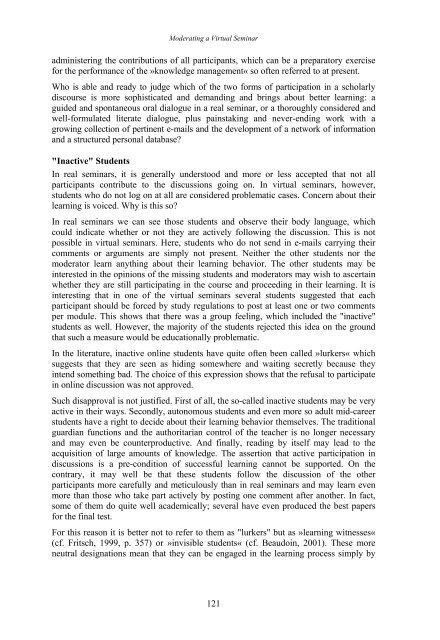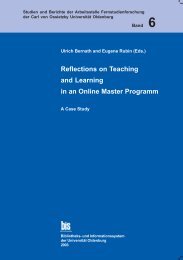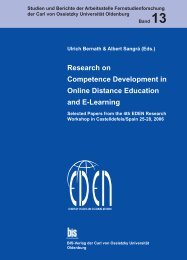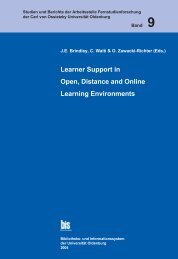Distance Education in Transition - Master of Distance Education ...
Distance Education in Transition - Master of Distance Education ...
Distance Education in Transition - Master of Distance Education ...
Create successful ePaper yourself
Turn your PDF publications into a flip-book with our unique Google optimized e-Paper software.
Moderat<strong>in</strong>g a Virtual Sem<strong>in</strong>ar<br />
adm<strong>in</strong>ister<strong>in</strong>g the contributions <strong>of</strong> all participants, which can be a preparatory exercise<br />
for the performance <strong>of</strong> the »knowledge management« so <strong>of</strong>ten referred to at present.<br />
Who is able and ready to judge which <strong>of</strong> the two forms <strong>of</strong> participation <strong>in</strong> a scholarly<br />
discourse is more sophisticated and demand<strong>in</strong>g and br<strong>in</strong>gs about better learn<strong>in</strong>g: a<br />
guided and spontaneous oral dialogue <strong>in</strong> a real sem<strong>in</strong>ar, or a thoroughly considered and<br />
well-formulated literate dialogue, plus pa<strong>in</strong>stak<strong>in</strong>g and never-end<strong>in</strong>g work with a<br />
grow<strong>in</strong>g collection <strong>of</strong> pert<strong>in</strong>ent e-mails and the development <strong>of</strong> a network <strong>of</strong> <strong>in</strong>formation<br />
and a structured personal database?<br />
"Inactive" Students<br />
In real sem<strong>in</strong>ars, it is generally understood and more or less accepted that not all<br />
participants contribute to the discussions go<strong>in</strong>g on. In virtual sem<strong>in</strong>ars, however,<br />
students who do not log on at all are considered problematic cases. Concern about their<br />
learn<strong>in</strong>g is voiced. Why is this so?<br />
In real sem<strong>in</strong>ars we can see those students and observe their body language, which<br />
could <strong>in</strong>dicate whether or not they are actively follow<strong>in</strong>g the discussion. This is not<br />
possible <strong>in</strong> virtual sem<strong>in</strong>ars. Here, students who do not send <strong>in</strong> e-mails carry<strong>in</strong>g their<br />
comments or arguments are simply not present. Neither the other students nor the<br />
moderator learn anyth<strong>in</strong>g about their learn<strong>in</strong>g behavior. The other students may be<br />
<strong>in</strong>terested <strong>in</strong> the op<strong>in</strong>ions <strong>of</strong> the miss<strong>in</strong>g students and moderators may wish to ascerta<strong>in</strong><br />
whether they are still participat<strong>in</strong>g <strong>in</strong> the course and proceed<strong>in</strong>g <strong>in</strong> their learn<strong>in</strong>g. It is<br />
<strong>in</strong>terest<strong>in</strong>g that <strong>in</strong> one <strong>of</strong> the virtual sem<strong>in</strong>ars several students suggested that each<br />
participant should be forced by study regulations to post at least one or two comments<br />
per module. This shows that there was a group feel<strong>in</strong>g, which <strong>in</strong>cluded the "<strong>in</strong>active"<br />
students as well. However, the majority <strong>of</strong> the students rejected this idea on the ground<br />
that such a measure would be educationally problematic.<br />
In the literature, <strong>in</strong>active onl<strong>in</strong>e students have quite <strong>of</strong>ten been called »lurkers« which<br />
suggests that they are seen as hid<strong>in</strong>g somewhere and wait<strong>in</strong>g secretly because they<br />
<strong>in</strong>tend someth<strong>in</strong>g bad. The choice <strong>of</strong> this expression shows that the refusal to participate<br />
<strong>in</strong> onl<strong>in</strong>e discussion was not approved.<br />
Such disapproval is not justified. First <strong>of</strong> all, the so-called <strong>in</strong>active students may be very<br />
active <strong>in</strong> their ways. Secondly, autonomous students and even more so adult mid-career<br />
students have a right to decide about their learn<strong>in</strong>g behavior themselves. The traditional<br />
guardian functions and the authoritarian control <strong>of</strong> the teacher is no longer necessary<br />
and may even be counterproductive. And f<strong>in</strong>ally, read<strong>in</strong>g by itself may lead to the<br />
acquisition <strong>of</strong> large amounts <strong>of</strong> knowledge. The assertion that active participation <strong>in</strong><br />
discussions is a pre-condition <strong>of</strong> successful learn<strong>in</strong>g cannot be supported. On the<br />
contrary, it may well be that these students follow the discussion <strong>of</strong> the other<br />
participants more carefully and meticulously than <strong>in</strong> real sem<strong>in</strong>ars and may learn even<br />
more than those who take part actively by post<strong>in</strong>g one comment after another. In fact,<br />
some <strong>of</strong> them do quite well academically; several have even produced the best papers<br />
for the f<strong>in</strong>al test.<br />
For this reason it is better not to refer to them as "lurkers" but as »learn<strong>in</strong>g witnesses«<br />
(cf. Fritsch, 1999, p. 357) or »<strong>in</strong>visible students« (cf. Beaudo<strong>in</strong>, 2001). These more<br />
neutral designations mean that they can be engaged <strong>in</strong> the learn<strong>in</strong>g process simply by<br />
121





